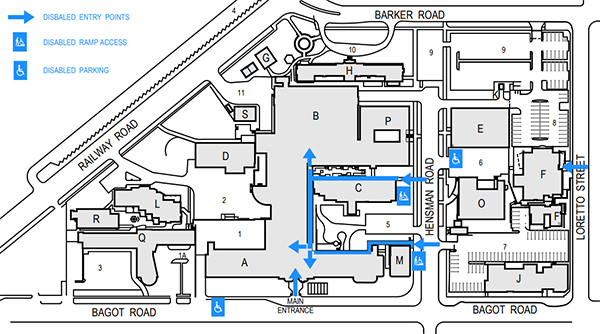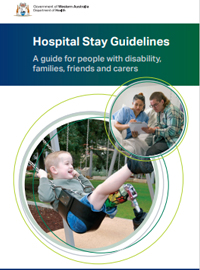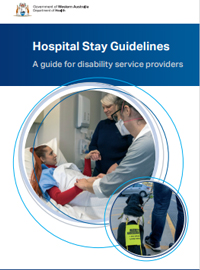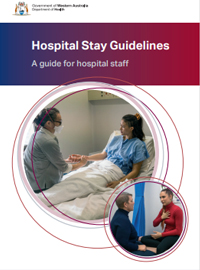Supporting carers and people with a disability
Support for carers
A carer is someone who provides unpaid care and support to a family member or friend who lives with:
- disability
- mental illness
- chronic health condition
- terminal illness
- alcohol or other drug issues
- is frail and / or aged.
Most carers don't see themselves as carers. When someone cares for a family member or friend living with additional care needs, they may need support too.
At WNHS we recognise that carers play a fundamental role in the delivery of care and we support the Western Australia Carers Charter as defined by the Carers Recognition Act 2004 (external site) which outlines how carers are to be treated and involved in delivering some services which impact them as a carer.
The Western Australian Carers Charter states:
- Carers must be treated with respect and dignity
- The role of carers must be recognised by including carers in the assessment, planning, delivery and review of services that impact on them and the role of carers
- The views and needs of carers must be taken into account along with the views, needs and best interests of people receiving care when decisions are made that impact on carers and the role of carers
- Complaints made by carers in relation to services that impact them and the role of carers must be given due attention and consideration.
The peak body in Western Australia for support, services and carer representation is Carers WA (external site).
Carers WA can be contacted by:
Tel: 1300 227 377
Email: info@carerswa.asn.au
To find out more about how we can help you, talk to the Consumer Liaison Service staff or one of your clinical team members.
For additional support you may wish to contact our Social Work Department. You can call (08) 6458 2777 between 8.30am and 4.30pm Monday to Friday. It is located on the Lower Ground Floor, B-Block.
Carer Gateway
Carer Gateway (external site) is an Australian Government network of service providers. They will talk through what you need and help you to find local services and support. They can be contacted by:
Tel: 1800 422 737
Living with a disability
Supporting people with disability to access health services is essential to inclusive health care. In accordance with the Disability Services Act 1993 (external site), the North Metropolitan Health Service (NMHS) and Women and Newborn Health Service (WNHS) have developed the Disability Access and Inclusion Plan (DAIP) (PDF). The DAIP sets a clear focus for NMHS and WNHS from 2022 to 2027.
If you, your family member, or friend are living with a disability and require assistance as a patient to access the services at WNHS, please contact the Consumer Liaison Service (CLS) and we will assist to meet your needs. You can contact the CLS by:
Tel: (08) 6458 1444
Email: WNHSCLS@health.wa.gov.au
Site accessibility
A Site Accessible Map (PDF) is available for King Edward Memorial Hospital patients and visitors. There is a hospital concierge located on the left as you enter the hospital main entrance that can assist patients and visitors to find their way around the hospital.
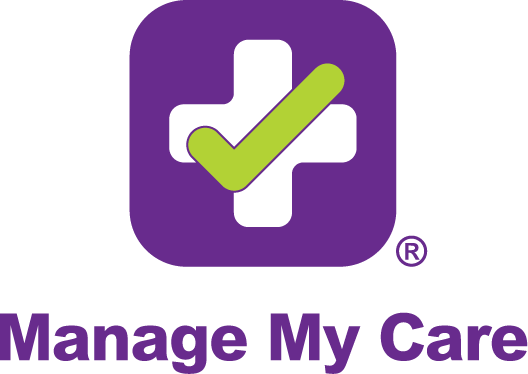

Manage My Care
Manage My Care is a free mobile and web-based app where you can track public outpatient appointments and referrals for yourself or those in your care at times that are convenient for you. You can download the Manage My Care app by using your mobile phone QR reader and scanning the QR code or by visiting the Manage My Care App (external site).
Health Passports
A Health Passport is a patient / carer-controlled tool designed to improve communication and empower people with disability, their families, and carers to be more involved in their healthcare. There are different types of Health Passports you can use depending on your health needs and how you would like to communicate. Having a Health Passport may help to improve your health care. It is good to fill out your Health Passport before you go to hospital. You can give it to the hospital staff when you arrive.
The Health Consumers' Council WA (external site) and People with Disabilities (WA) (external site) have produced booklets and videos to assist people with disability to navigate the health system and prepare for a hospital admission including:
- outlining health care rights
- where to go for help
- key considerations across the entire hospital journey
Additional resources
The Western Australian Department of Health has developed a series of Hospital Stay Guidelines to support the State Disability Strategy 2020-2030. The following guidelines, including examples of Health Passports, are available:


